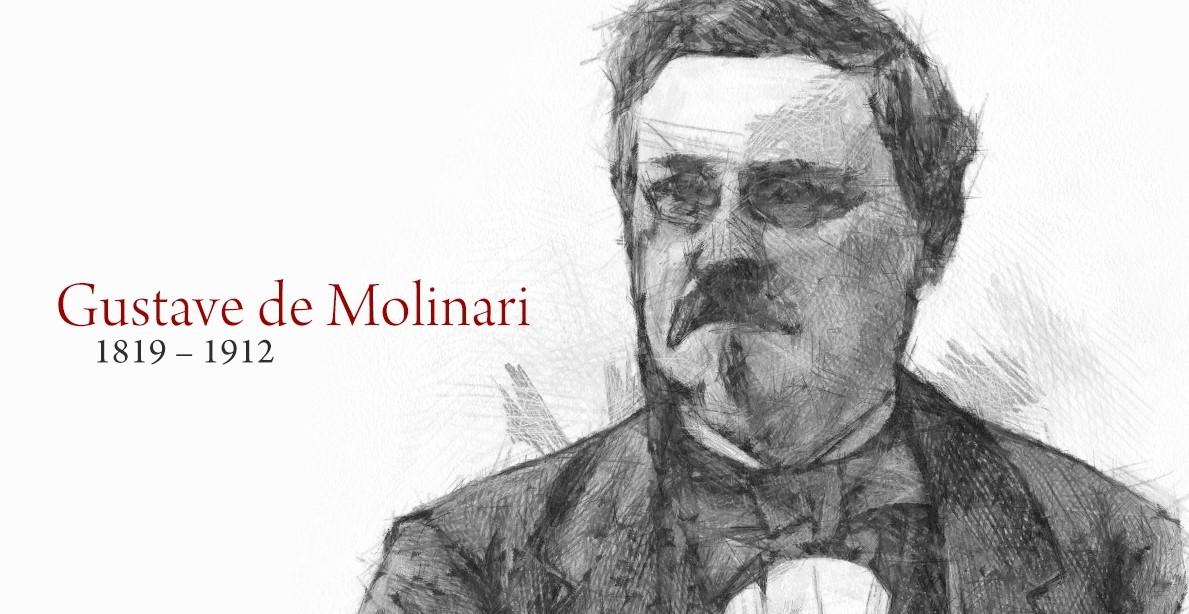
Gustave de Molinari, First Anarcho-Capitalist
Of all the leading libertarian French economists of the mid- and late nineteenth centuries, the most unusual was the Belgian-born Gustave de Molinari (1819-1912). Born in Liege, the son of a Belgian physician and a baron who had been an officer in the Napoleonic army, Molinari spent most of his life in France, where he became a prolific and indefatigable author and editor in lifelong support of pure laissez-faire, of international peace, and in determined and intrasigent opposition to all forms of statism, governmental control and militarism. In contrast to British soft-core utilitarianism on public policy, Molinari was an unflinching champion of freedom and natural law.
Coming to Paris, the cultural and political centre of the French-speaking world, at the age of 21 in 1840, Molinari joined the Societe d’Economie Politique on its inception in 1842, and became the secretary of Bastiat’s association for free trade when it was formed in Paris in 1846. He soon became one of the editors of the association’s periodical, Libre-Echange. Molinari quickly began to publish widely in the free trade and free market press in Paris, becoming an editor of the Journal des Economistes in 1847. He published his first of many books in 1846, Etudes Economiques: sur I’Organisation de la Liberte industrielle et I’abolition de I’esclavage (Economic Studies: on the Organizaton of Liberty and the Abolition of Slavery).
The young Molinari, however, hit the laissez-faire-oriented Societe d’Economie Politique like a thunderclap in 1849, with his most famous and original work. He delivered a paper expounding, for the first time in history, a pure and consistent laissez-faire, to the point of calling for free and unhampered competition in what are generally called uniquely ‘public’ services: in particular, the sphere of police and judicial protection of person and private property. If free competition is better and more efficient in supplying all other goods and services, Molinari reasoned, why not for this last bastion, police and judicial protection—a view that over a century later would come to be called ‘anarcho-capitalism’.
Molinari first set forth his view in the Journal des Economistes, the periodical of the Societe, in February 1849.18 This article was quickly expanded into book form, Les Soirees de la Rue Saint-Lazare, a series of fictional dialogues between three protagonists: the conservative (advocate of high tariffs and state monopoly privilege); the socialist; and the economist (clearly himself). The final, or eleventh, Soiree elaborated further on how his concept of free market protective services could work in practice.19
A meeting of the Societe d’Economie Politique in the Autumn of 1849 was devoted to Molinari’s radically new theory as expounded in the Soirees. After Molinari had presented the essence of his proposal in a paper, the assembled libertarian dignitaries engaged in a discussion. Apparently the new theory threw them, because unfortunately no one dealt with the essence of the new doctrine. Charles Coquelin and Frederic Bastiat could only fulminate that no competition anywhere can exist without a back-up by the supreme authority of the state (Coquelin), and that the force needed to guarantee justice and security can only be imposed by a ‘supreme power’, (Bastiat). Both engaged in pure assertion without argument, and both here chose to ignore what they knew full well in all other contexts: that this ‘supreme power’ had scarcely proved to be a reliable guarantor of private property in the past or present (to say nothing, alas, of the future).
Of all the leading libertarian minds assembled, only Charles Dunoyer deigned to try to rebut Molinari’s argument. He deplored that Molinari had been carried away by the ‘illusions of logic’, and maintained that ‘competition between governmental companies is chimerical, because it leads to violent battles’. Apart from ignoring the truly violent battles that have always occurred between states in our existing ‘international anarchy’, Dunoyer failed to grapple with the very real incentives that would exist in an anarcho-capitalist world for defence companies to engage in treaties, contracts and arbitrations.20 Instead, Dunoyer proposed to rely on the ‘competition’ of political parties within a representative government—hardly a satisfactory solution to the problem of social conflict from a libertarian, anti-statist point of view. Dunoyer also opined that it was most prudent to leave force in the hands of the state, ‘where civilization has put it’ – this from one of the great founders of the conquest theory of the state!
Unfortunately, except for these few remarks, the libertarian economists assembled failed to deal with Molinari’s thesis, their discussion largely criticizing Molinari for allegedly going too far in attacking all use of the power of eminent domain by the state.21
Particularly interesting was the general treatment of the maverick Molinari by his fellow French laissez-faire libertarian economists. Even though he persisted in advocating his anarcho-capitalist or free market protection views for many decades (e.g. in his Les Lois Naturelles de I’Economie Politique, 1887), Molinari was scarcely treated as a pariah for his heretical views. On the contrary, he was treated as he indeed was: the logical culmination of their own laissez-faire views which they respected even though they could not fully agree. On the death ofJoseph Garnier in 1881, Molinari became the editor of the Journal des Economistes, a post which he occupied until his ninetieth year in 1909.22 Molinari only backtracked on his anarchistic views in his very late works, beginning in his Esquisse de l’organisation politique et economique de societe future (1899). Here he retreated to the idea of a single monopoly defence and protection company, which service would be contracted out by the central state to a single private corporation.23
How Molinari was considered by his colleagues may be seen from the footnote by Joseph Garnier, the editor of the Journal, on introducing Molinari’s first revolutionary article in 1849. Garnier noted:
Although this article may appear utopian in its conclusions, we nevertheless believe that we should publish it in order to attract the attention of economists and journalists to a question which has hitherto been treated in only a desultory manner and which should, nevertheless, in our day and age, be approached with greater precision. So many people exaggerate the nature and prerogatives of government that it has become useful to formulate strictly the boundaries outside of which the intervention of authority becomes anarchical and tyrannical rather than protective and profitable.24
Fifty-five years later, at the appearance of the first English translation of Molinari’s work, his fellow-octogenarian, the laissez-faire attorney and economist, Frederic Passy (1822-1912), wrote a moving tribute to his old friend and colleague Molinari. He wrote of his ‘esteem and admiration for the character and talent’ of the man ‘who is the doyen of our …liberal economists—of the men with whom, though, alas! few in number, I have been happy to stand side-by-side during more than half a century’. Passy went on to state that these liberal principles had been proclaimed by Cobden, Gladstone and Bright in England, and by Turgot, Say, Chevalier and Bastiat in France. ‘And my belief grows yearly stronger that, but for these principles, the societies of the present would be without wealth, peace, material greatness, or moral dignity.’ Molinari, Passy added, ‘has maintained these principles from his youth’, from his Soiree de la Rue St. Lazare during the 1848 Revolution, though lectures and writings, to his editorship of the Journal des Economistes, where ‘month-by-month the important Review of which he is editor-in-chief repeats them in a fresh guise’. And finally, Molinari’s books, where: ‘annually, so to speak, a further book, as distinguished for clearness of grasp as for admirable literary style, goes out to testify to the constancy of his convictions no less than to the unimpaired vigour of his mental outlook and the virile serenity of his green old age.’25
This article is a selection from An Austrian Perspective on the History of Economic Thought, Vol. 2.
18. Gustave de Molinari, ‘De la production de la securite’, Journal des Economistes, XXV (Feb. 1849), pp. 277-90. Translated as Gustave de Molinari, The Production of Security (trans. J. McCulloch, New York: Center for Libertarian Studies, May 1977).
19. See the complete translation ofthe eleventh soiree in ‘Appendix’, David M. Hart, ‘Gustave de Molinari and the Anti-statist Liberal Tradition, Part III’, The Journal of Libertarian Studies, VI (Winter 1982), pp. 88-102.
20. See Murray N. Rothbard, For a New Liberty: the Libertarian Manifesto (1973, rev. ed., New York: Libertarian Review Foundation, 1985). For an appreciative discussion of Molinari and of the concept of total privatization of protection from crime, see Bruce L. Benson, ‘Guns for Protection and Other Private Sector Responses to the Fear of Rising Crime’, in D. Kates (ed.), Firearms and Violence: Issues ofPublic Policy (San Francisco: Pacific Institute for Public Policy Research, 1984), pp. 346-56. Also see Benson, The Enterprise ofLaw (San Francisco: Pacific Institute, 1990).
21. For the discussion around Molinari’s thesis, see the Journal des Economistes, XXIV (15 October 1849), pp. 315-6. For more on a summary of the discussion, see Murray N. Rothbard, ‘Preface’, Molinari, op. cit., note 18, pp. i-iii.
22. Molinari lived in Belgium during the decade of the 1850s. He returned to Belgium upon the coup d’etat of Louis Napoleon in December 1851, which precipitated Bonaparte’s despotism in France. With the aid of his friend Charles de Brouckere, Molinari was appointed professor of political economy at the Belgian Royal Museum of Industry in Brussels, and at the Higher Institute of Commerce in Antwerp. His lectures at the museum formed the basis of Molinari’s major theoretical work, his Cours d’Economie Politique (2 vols, Paris, 1863). Molinari continued to write articles and reviews for the Journal des Economistes .during his Belgian years, also founding the Economiste beige in 1855, an even more frankly radical journal which he continued to edit for another 13 years. Molinari returned to Paris in 1860, becoming editor-in-chief of the laissez~faire journal, the Journal des Debats, from 1871 to 1876.
23. This book was unfortunately the only one of Molinari’s works to be translated into English, as The Society of Tomorrow (New York: G.P. Putnam’s Sons, 1904). On Molinari’s retreat in his later years, and for an elaboration of his views in general, see David M. Hart, ‘Gustave de Molinari and the Antistatist Liberal Tradition, Part II’, The Journal o.f Libertarian Studies, V (Autumn 1981), pp. 399-434.
24. Molinari, op. cit., note 18, pp. 1-2.
25. Frederic Passy, ‘Prefatory Letter’, in Molinari, op. cit., note 23, pp. xxviii-xxix. A prolific author on economics himself, Passy was at one point president of the Societe d’Economie Politique, as well as a member of the French Chamber of Deputies, 1881-88. Passy was a co-founder of the International Peace League in 1867, and, for his work on behalf of peace and international arbitration, was awarded the Nobel Peace Prize in 1901.



